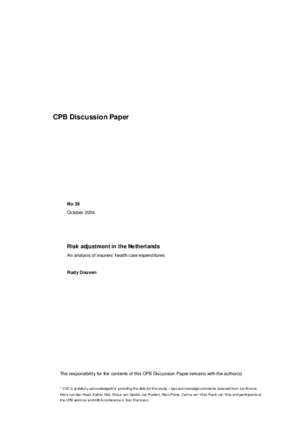Risk adjustment in the Netherlands; an analysis of insurers' health care expenditures
Risicoverevening ziekenfondsen sterk verbeterd
We are sorry, unfortunately there is no English translation of this page.
Contacts

As of 2006, the Dutch healthcare system will be run by regulated competition. An important part of regulated competition is a system of risk adjustment.
This paper presents an empirical analysis of the effects of risk adjustment in the Dutch social health insurance system covering the years 1991-2001. By comparing insurers' health care expenditures with their risk adjusted premiums, our analysis estimates the impact of risk adjustment over a number of years.
Results indicate that the risk-adjustment system has improved substantially. Whereas in the beginning of the nineties prospective risk adjustment could explain about 20% of the variation in health care expenditure differentials between insurers, this figure rose to 55% in 2001. The explanation of the same variation after retrospective payments did not show a clear upward or downward trend, and has varied since 1995 around 85%.
The remaining variation in insurers' health care expenditure differentials are determined more by structural than random factors. One such factor may be related to the low ex-ante projections of the government's total health care expenditures, which favour insurers with a population of relatively good health risks. Results show that new entrants in the Dutch health insurance market had significantly lower health care expenditures. Furthermore, economies of scale do not seem to have played a role during the sample period: the expenditures of large insurers were not significantly lower than those of the smaller insurers.
Downloads
Authors

